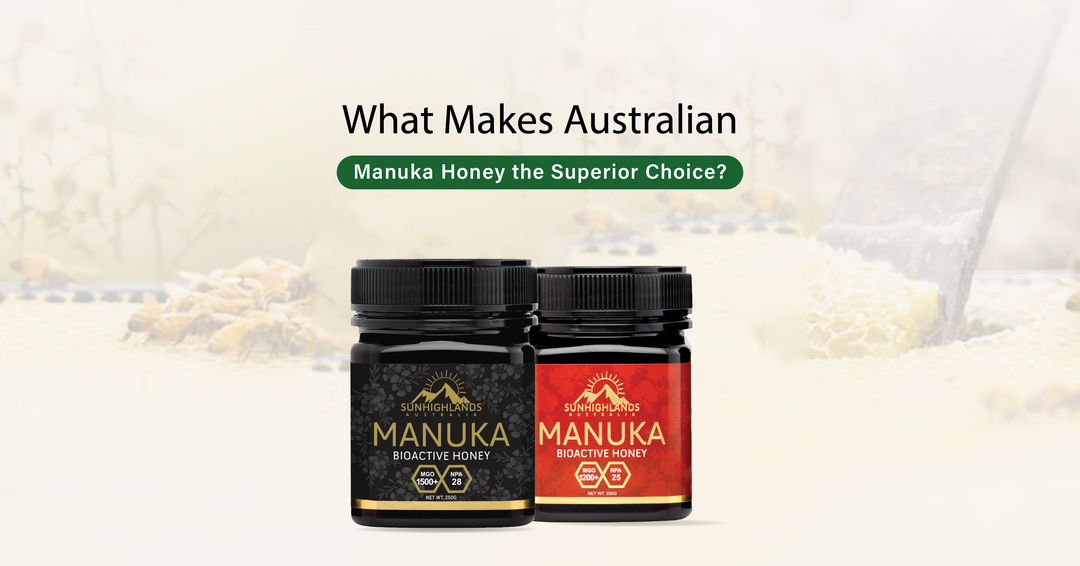Unlocking Relief: Can Manuka Honey Help Treat Psoriasis?

Psoriasis, a persistent skin condition that can be particularly exacerbated by cold and dry weather, is marked by red, itchy, and inflamed patches on the skin. If you've struggled with these symptoms, you know how challenging it can be to find relief.
Today, we explore the potential of Manuka honey, nature’s golden remedy, in treating psoriasis. Let's delve into how this honey can help soothe the symptoms and restore your skin's health.
Understanding Psoriasis
Psoriasis is a chronic inflammatory skin disease affecting around 2 to 4 per cent of the Australian population. It manifests as rashes and patches due to the rapid overgrowth of skin cells. The symptoms can range from minor irritations to severe cases that interfere with daily activities. Patients often find it difficult to engage in everyday activities due to the discomfort and social stigma associated with visible patches.
Causes of Psoriasis
The exact cause of psoriasis remains a mystery, but it is believed to result from a combination of genetic, immune system, and environmental factors:
- Genetic Factors: Psoriasis often runs in families, suggesting a genetic predisposition.
- Environmental Factors: Stress, skin injuries, infections, certain medications, smoking, and heavy alcohol consumption can trigger or worsen the condition.
- Other Factors: Hormonal changes, particularly in women, and obesity are also known contributors.
Why Manuka Honey for Psoriasis?
Manuka honey, harvested from the Manuka tree in Australia, is renowned for its powerful therapeutic properties. Its benefits include antibacterial, anti-inflammatory, and antioxidant effects, making it a promising treatment for psoriasis. The presence of methylglyoxal (MGO) in Manuka honey enhances its ability to fight bacteria and reduce inflammation, which can be beneficial for soothing psoriasis symptoms.
Using Manuka Honey for Psoriasis
Before starting any new treatment, it’s important to consider the following:
- Does Manuka honey suit me?
- Which MGO rating is recommended for me?
- What’s the most effective way to use it?
- What are the signs indicating that I should stop using it?
- Why did I develop psoriasis?
- Do I have a family history or environmental factors contributing to it?
- Which Manuka honey brand should I consider for natural, unprocessed honey?
- What was my prior experience with honey on my skin?
Application Steps
If you find that Manuka honey is suitable for you, follow these steps to apply it to the affected areas:
- Clean the Area: Use a sterile cotton cloth or dermatologically tested alcohol wipes to clean the affected area.
- Apply Honey: Pour a small amount of honey onto the area using a dropper or clean applicator.
- Cover: Cover the honey-coated area with a bandage to protect it and prolong the honey's effects.
- Leave it On: Leave the honey on for several hours or overnight.
- Rinse: Gently rinse off the honey with warm water and pat the area dry with a clean towel.
- Repeat: Repeat this process daily or as needed, depending on the severity of your psoriasis and your response to the treatment.
Conclusion
Manuka honey offers a natural approach to managing psoriasis, providing relief through its moisturising, antibacterial, and anti-inflammatory properties. However, it’s important to consult with a healthcare professional before starting any new treatment. While Manuka honey can be an effective supplementary treatment, it should be used in conjunction with prescribed medications and treatments.
Embrace the potential of Manuka honey to bring comfort and improvement to your skin. Stay blessed, and we’ll be back soon with more wellness tips.





